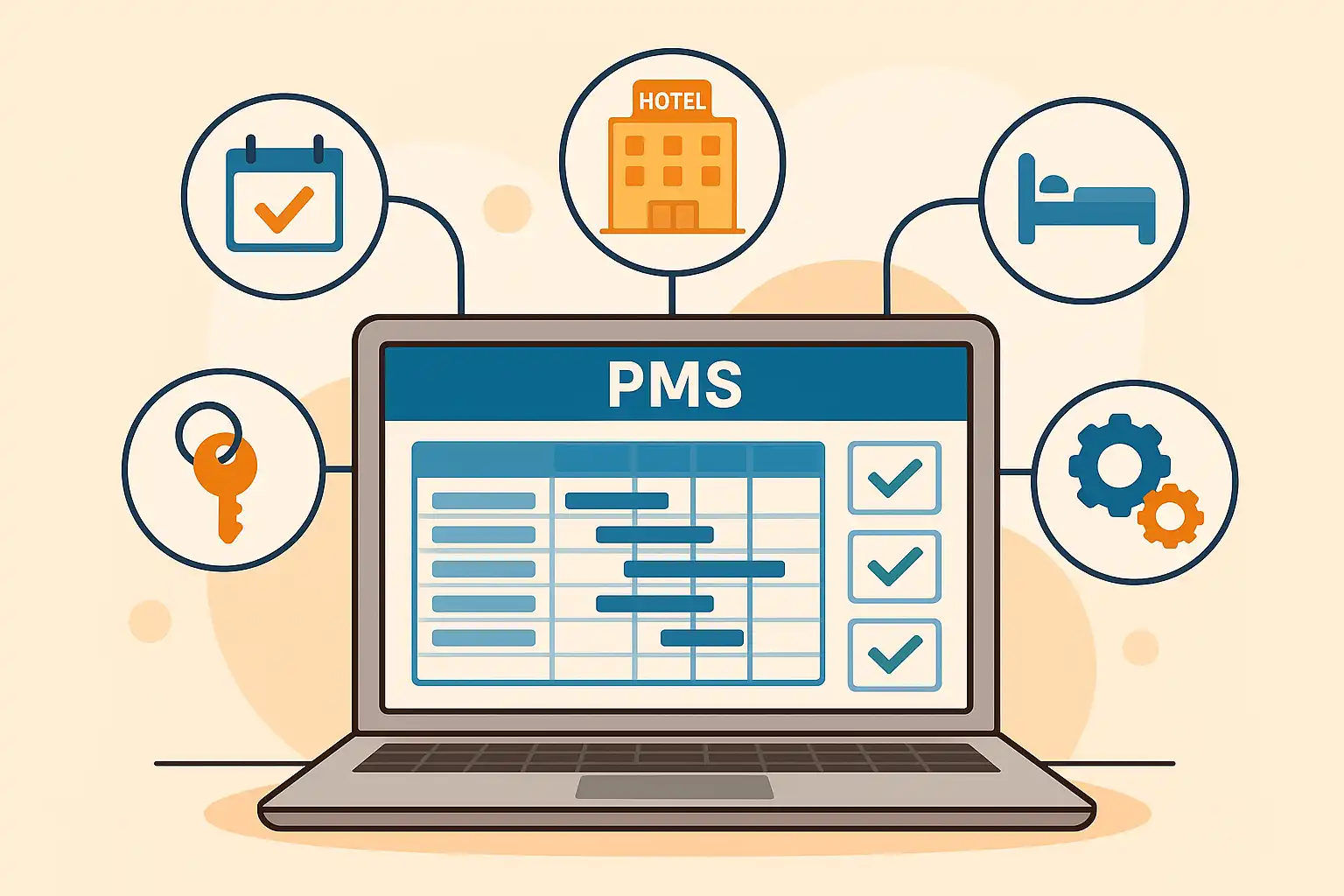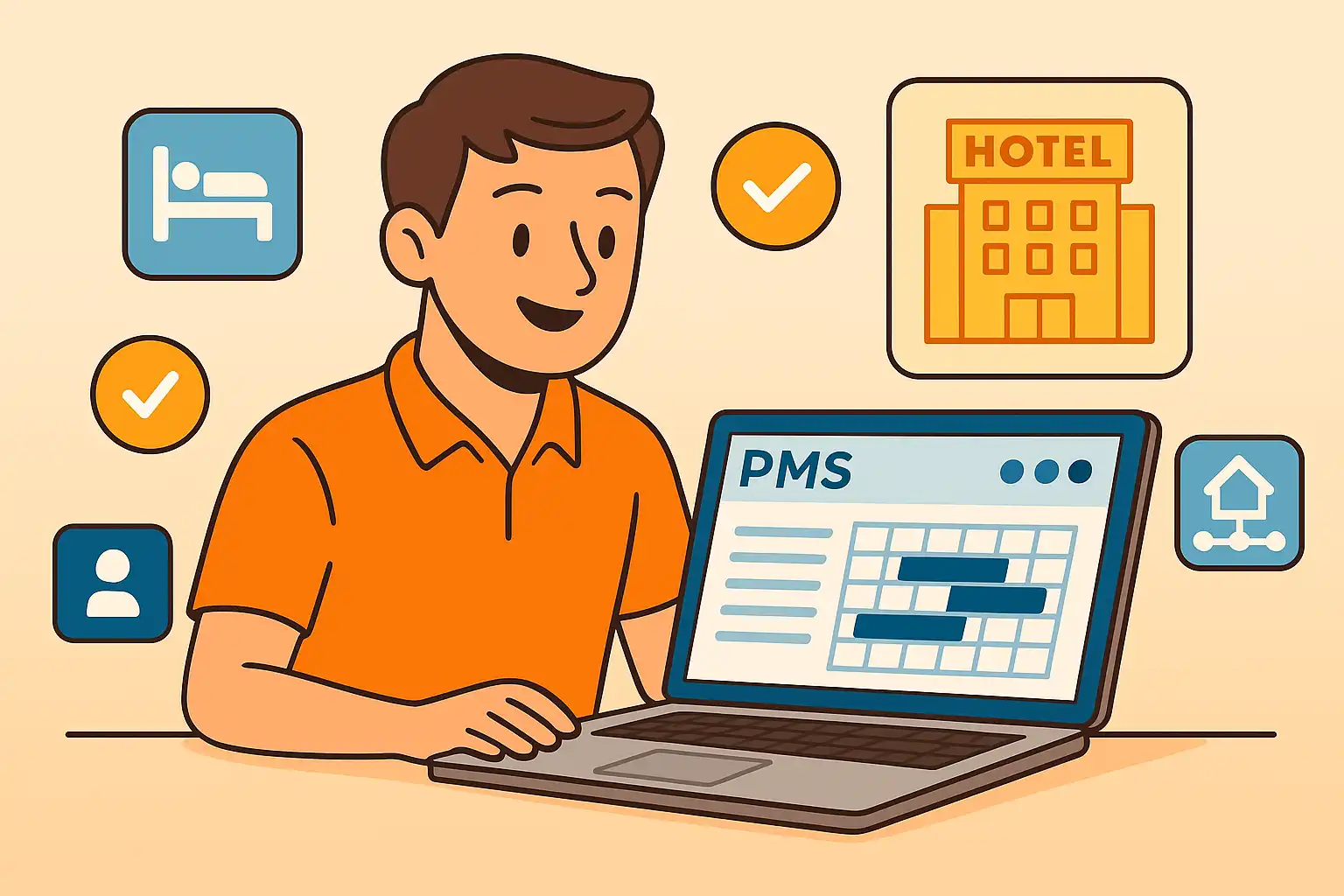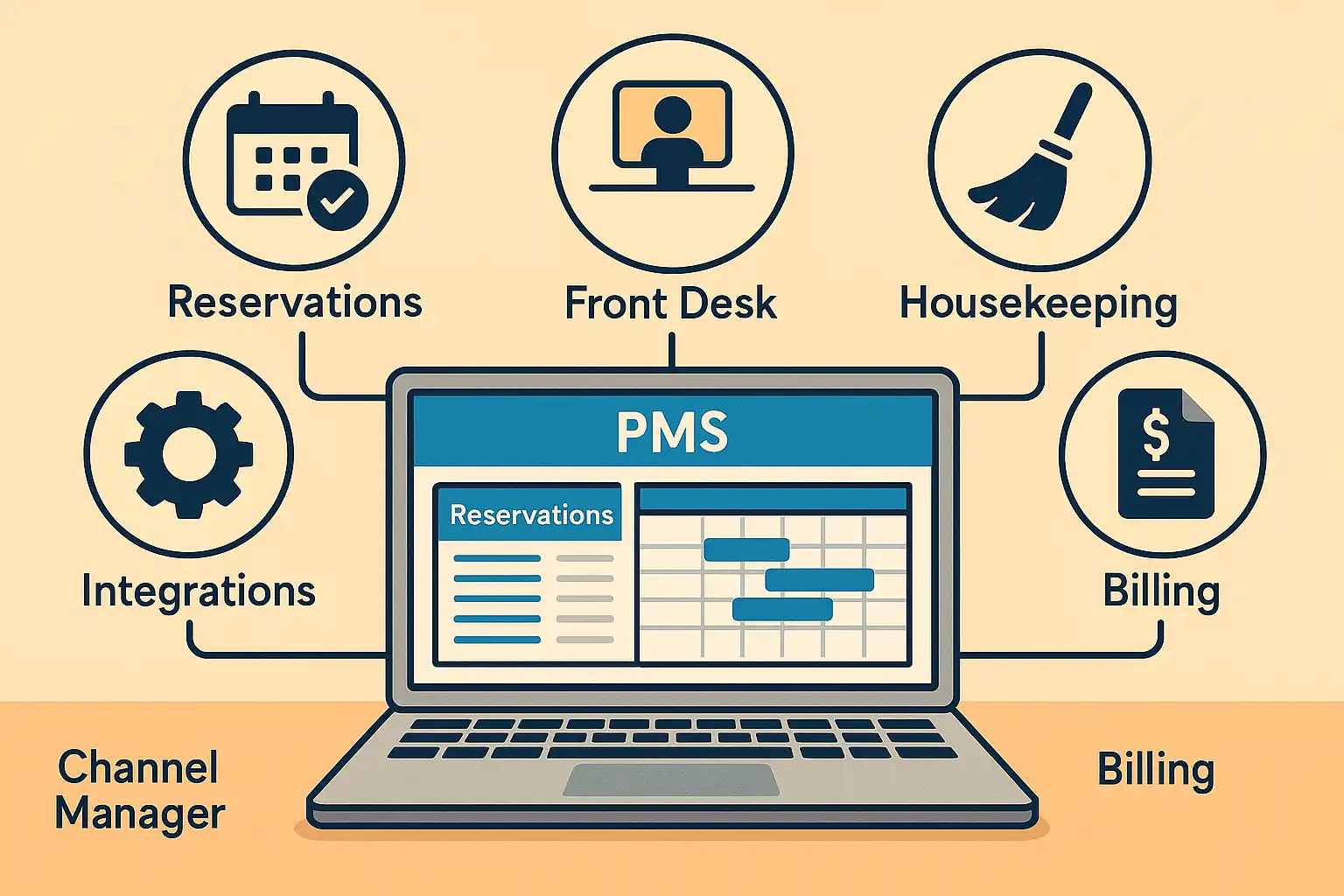PMS System: What Is a Property Management System for Hotels
 Mika Takahashi
Mika Takahashi Mika Takahashi
Mika TakahashiRunning a hotel today means juggling a lot—guest reservations, front desk check-ins, housekeeping schedules, revenue strategies, and more. At the center of it all is the property management system (PMS), the tech tool that keeps your hotel running like a well-oiled machine.
Think of a property management system pms as the nervous system of your hotel. It connects your departments, cuts down on tedious manual work, and helps your team focus on what really matters: delivering a smooth guest experience. Whether you’re managing a single boutique hotel or a chain of properties, knowing how to pick and use the right PMS can make a huge difference.
In this guide, we’ll cover everything from what a modern property management system does, to the must-have features, and what the future holds for hotel tech.

At its core, a property management system is the software platform that runs your hotel’s day-to-day operations. It’s much more than just a booking tool. A modern PMS ties together reservations, front desk tasks, billing, housekeeping, and guest management into one seamless system.
Here are the key functions you’ll find in most hotel property management systems:
The leap from paper ledgers to cloud-based PMS solutions is one of the biggest tech shifts in hospitality. Today’s systems connect every part of your hotel, helping your staff work smarter and guests feel cared for.
These platforms are the foundation for managing hotel operations efficiently, giving property owners a single view of guest preferences, room inventory, and revenue management.
Modern hotel PMS software isn’t just about reservations. It’s a full toolkit designed to streamline every department. Let’s break down the main modules you should expect.
Reservation Management
This is the heart of your PMS. It keeps your room availability up to date across all channels and handles direct and group bookings. No more double-bookings or manual inventory checks.
Front Desk Operations
Your front desk staff use this module to check guests in and out, assign rooms, and access guest services quickly. Integration with key card systems means smooth room access and better security.
Housekeeping Management
Housekeeping teams track room status in real time, schedule cleanings, and flag maintenance issues. When a guest checks out, housekeeping gets notified immediately, so rooms turn over faster.
Real-world example: At a mid-sized hotel, housekeeping staff using the PMS app reduced room turnaround time by 20%, freeing up rooms sooner for new guests.
Revenue Management System
This module uses data on demand, competitor pricing, and past trends to adjust room rates dynamically. It helps you maximize revenue without constant manual rate changes.
Guest Profile and CRM
Store detailed guest info—preferences, stay history, communication logs—to tailor services and build loyalty programs that encourage repeat visits.
Channel Management
An integrated channel manager pushes your room inventory and rates out to multiple OTAs and booking sites at once. It keeps rates consistent and prevents overbookings.
Point-of-Sale Integration
Connect your hotel’s restaurants, spas, and shops directly to the PMS so guests can charge purchases to their room bill, making checkout hassle-free.
Back-Office Management
Handle accounting, payroll, and staff scheduling all in one place. This cuts down on duplicate data entry and keeps your operations running smoothly.
Mobile Apps and Self-Service Options
Mobile apps for staff and guests, plus self-service kiosks, support contactless check-ins and streamline guest interactions.

Choosing between cloud pms and on premises software is a big decision. Each has pros and cons depending on your hotel’s needs and tech setup.
Cloud-based PMS platforms let you access your system from anywhere with an internet connection. Updates happen automatically, so you’re always running the latest version without IT headaches.
Financially, cloud PMS usually means lower upfront costs and predictable monthly fees. You can get up and running in weeks, not months.
Key Cloud Benefits:
On-premise PMS software is installed locally on your hotel’s servers. You have full control over data and can customize your system extensively.
But it comes with higher upfront costs for hardware and licenses, plus ongoing IT support. Deployment can take several months.
| Feature | Cloud PMS | On-Premise PMS |
|---|---|---|
| Initial Investment | $3,000-$10,000 | $50,000-$200,000 |
| Monthly Costs | $5-$25 per room | Minimal ongoing fees |
| IT Support | Included | Additional staff required |
| Updates | Automatic | Manual installation |
| Implementation Time | 2-8 weeks | 3-6 months |
A good PMS can transform your hotel’s operations. Here’s what you can expect.
Automation cuts down on repetitive tasks. Check-ins take minutes, billing errors drop, and your team spends less time on paperwork.
When housekeeping updates a room’s status, the front desk sees it immediately—no more guesswork or communication delays.
Pro tip: Train your housekeeping and front desk teams together on the PMS. When everyone understands how updates flow through the system, your hotel runs smoother.
Dynamic pricing tools adjust room rates based on real-time market data. Hotels often see a 10-15% revenue bump within the first year by using these features.
Managing rates across multiple channels at once prevents revenue leakage and keeps your pricing competitive.
With detailed guest profiles, your staff can anticipate preferences and offer personalized service—whether it’s a favorite pillow or a preferred room location.
Self-service kiosks and mobile check-ins cut wait times, especially during busy periods, improving guest satisfaction.
Modern PMS software uses encryption and tokenization to protect guest data and payment info. Cloud providers often have security measures far beyond what individual hotels can manage.
Automated compliance reporting helps you meet industry regulations without added stress.

Picking the right PMS is about matching your hotel’s unique needs with the right features and support.
Start by listing your current workflows and pain points. Smaller hotels might prioritize ease of use and core features, while larger properties need multi-property support and detailed reporting.
Think about your property type:
Your PMS should play well with your existing tools. Look for smooth integration with:
A user-friendly interface means your staff learns faster and makes fewer mistakes. Test the front desk module thoroughly since it’s the busiest part of your system.
Common pricing models include:
Don’t forget to factor in setup, training, and integration costs.
The market offers options for every hotel size and type.
Oracle Hospitality OPERA Cloud is a favorite for large chains, offering multi-property management and deep analytics.
Marriott’s proprietary systems are tailored to their brands but require heavy investment.
Prostay is popular with small, medium and large properties, combining property management, channel management, and revenue tools.
Roomraccoon focuses on cloud tech with slick interfaces and automation to boost guest experience.
| Property Size | Recommended Features | Typical Budget |
|---|---|---|
| 1-25 rooms | Basic PMS, channel manager, booking engine | $150-$500/month |
| 26-100 rooms | Full PMS, revenue management, POS integration | $500-$2,000/month |
| 100+ rooms | Enterprise features, multi-property, advanced analytics | $2,000+/month |
Your PMS is the hub connecting many tools that keep your hotel running.
An integrated online booking engine lets guests book directly on your site, cutting out OTA commissions. It syncs instantly with your room inventory and pricing.
Your integrated channel manager pushes inventory and rates to multiple OTAs simultaneously, preventing overbookings and ensuring consistent pricing.
Automated messaging keeps guests informed from booking to post-stay reviews. Reputation management tools help you monitor and respond to online feedback quickly.
Payment processing built into your PMS simplifies billing and reduces PCI compliance headaches. Business intelligence tools pull data from all systems for clear insights into your hotel’s performance.
Understanding total costs upfront helps avoid surprises.
Basic Systems ($3-$8 per room monthly)
Good for small properties with essential features.
Mid-Range Systems ($8-$15 per room monthly)
Include revenue management, channel distribution, and guest communication.
Premium Systems ($15-$25 per room monthly)
Offer advanced analytics, customization, and integrations for large properties.
| Cost Category | Budget Range | Timeline |
|---|---|---|
| Setup and configuration | $2,000-$15,000 | 2-8 weeks |
| Staff training | $1,000-$5,000 | 1-3 weeks |
| Data migration | $500-$3,000 | 1-2 weeks |
| Custom integrations | $2,000-$20,000 | 4-12 weeks |
Hotels often see operational improvements within the first month. Revenue gains from dynamic pricing usually appear in 3-6 months. Most properties get a positive ROI within a year.
Hotel tech keeps evolving. Here’s what’s coming next.
AI helps automate pricing, demand forecasting, and guest service. It spots patterns humans might miss, making your revenue strategy sharper and your operations more proactive.
Smart rooms with automated controls and sensors connect to your PMS, helping you manage energy and maintenance more efficiently.
Mobile apps let staff manage operations on the go. Contactless check-in, digital keys, and voice-activated services improve guest convenience and safety.
Open APIs let you build a tech stack tailored to your needs, integrating best-of-breed tools without vendor lock-in.
Modern PMS solutions track energy use, waste, and sustainability metrics, helping you meet growing environmental expectations and save costs.
Choosing the right PMS is one of the most important tech decisions you’ll make. The right system cuts down on busywork, boosts revenue, and helps you deliver a better guest experience. Take the time to understand your needs, test your options, and plan your budget carefully.
When implemented well, a PMS becomes the backbone of your hotel’s success.
With the right PMS system, you can focus less on paperwork and more on what matters: creating exceptional guest experiences and running a profitable hotel business.